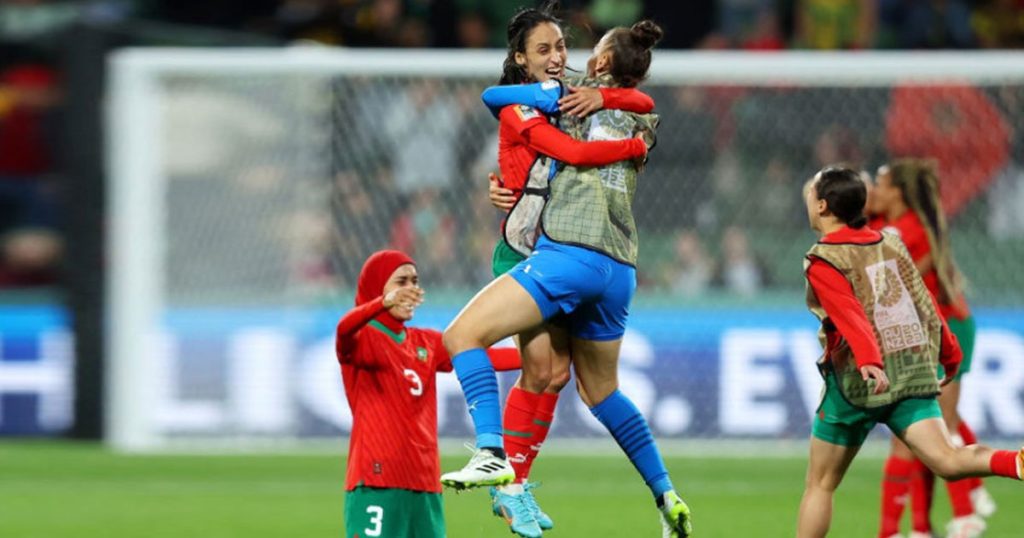» Impacts of football » Women’s Football and Gender Approach

The Moroccan society has undergone significant transformations, and one of the most visible aspects of these changes is the emergence of women in spaces traditionally dominated by the male sphere, such as streets, stadiums, and cafes, across most Moroccan cities. Furthermore, they now take on roles as match analysts, showcasing a deep understanding of players, their family backgrounds, and social origins. It’s worth noting that women’s participation in football continues to expand significantly, a phenomenon particularly observed during the 2022 World Cup in Qatar.
Here are some impressions that emerged while watching the matches of the Moroccan national team during the World Cup against Croatia, Belgium, and Canada. Cafés witnessed a noticeable female presence, with marches and lively celebrations following Morocco’s victory against Belgium, and the subsequent joy of advancing to the second round of the qualifiers. Despite the challenges of male dominance, women actively participated. These observations highlight the prevalence of a socially centered perspective on masculinity. These impressions can be considered as a starting point to identify indicators reflecting an ongoing shift. This change can also be observed in specific areas, such as the increasing social demand from women for education and employment, within the context of the official and civil adoption of a gender-based approach, leading to transformations in family structure and roles.
Sport stands out for its ability to transcend the boundaries of gender, religion, and nationality. While some women have indeed managed to confront ready-made stereotypes associated with social gender, the breaking of gender boundaries in Morocco has not remained limited. Moroccan women have succeeded in asserting their presence and representation in the field of sports, particularly in football. A notable example is the rise of the national women’s team during the 2023 FIFA Women’s World Cup, an international competition organized by the International Federation of Association Football (FIFA) jointly hosted by Australia and New Zealand. It is worth noting that the Moroccan team participated for the first time in its history in this World Cup, becoming the first Arab team from North Africa to qualify. The Lionesses of the Atlas have made Morocco, and the entire African continent, proud with their outstanding performance and victories in the 2023 FIFA Women’s World Cup.
In order to qualify and elevate the status of women in sports practice, management, and coaching within the framework of awareness and mobilization around the gender approach in sports, the National Technical Directorate of Referees of the Royal Moroccan Football Federation assigned the task of refereeing the 2022 Throne Cup final to the Moroccan international referee. This decision received widespread praise, with the Royal Football Federation expressing confidence in the competent female sporting talents. These steps are considered crucial in changing mindsets towards the full consecration of equality between women and men, combating discrimination, and transforming the Moroccan football culture that was reserved for men. This puts an end to the masculine mindset among Moroccan sports practitioners at various levels.
The idea of women’s football in Morocco is experiencing a real resurgence after the achievements, notably the qualification of the Moroccan national team for the first time in its history to the World Cup and reaching the final of the Africa Cup of Nations.
The emergence of women’s football in Morocco in recent years is not a random occurrence but stems from a deliberate effort by the Royal Moroccan Football Federation to develop and elevate it to the status it deserves, in response to directives from the International Federation of Association Football (FIFA). Achievements in women’s football in Morocco will continue to unfold, as there is a significant continental event awaiting the Lionesses of the Atlas in 2024. Morocco will host the African Women’s Cup of Nations next year for the second time in its history and consecutively, following the national Moroccan team’s second-place finish in the 2022 edition.
Morocco aspires to host the Women’s World Cup in 2031
Morocco seeks to enhance its standing in the international sports arena. It’s an opportunity for the country to affirm its ability to organize major international sporting events and attract global attention.
Enhancing Sports Participation and Interaction : The Women’s World Cup is a major sporting event that garners widespread viewership and considerable interest. Hosting it in Morocco would encourage local audiences to support women’s sports and promote increased female participation in the sports arena.
Regarding the economic impact, hosting the World Cup represents an opportunity to generate substantial revenue through tourism and investment in sports infrastructure. These funds could contribute to the development of other sectors of infrastructure and economic growth.
Concerning gender approach and equality in sports, organizing the Women’s World Cup fosters the promotion of gender equality in the sports domain. This event could play a crucial role in advancing women’s rights in society and encouraging their involvement in sports activities.
In summary, Morocco’s desire to host the Women’s World Cup is part of its efforts to bolster sports and economic development in the country, as well as to strengthen its position on the global sports stage.